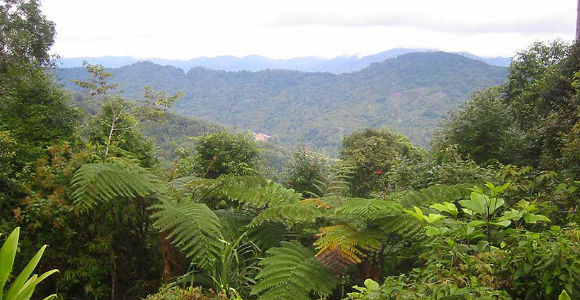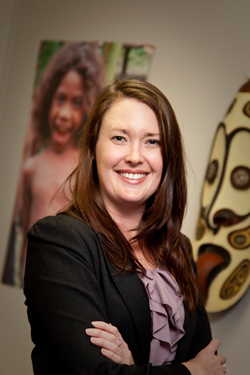Claims by the international media, and one outlet in particular, about the conditions and communities along the Kokoda Track have threatened the reputation of the tourism and trekking industry in PNG, writes Genevieve Nelson, the CEO of the Kokoda Track Foundation.

The Kokoda Track looking north from the Maguli Range. Credit: Australian Dept Veterans’ Affairs
An alleged incident on the Kokoda Track earlier this month is being investigated by PNG authorities. Coverage of the incident prompts me to refute the grossly inaccurate representations of Papua New Guinea, Kokoda and its people as reported by, in all its sensationalised glory, the UK’s Sun newspaper.
The reporting has defamed the character of some of the most trustworthy and generous people you will ever have the privilege to meet.
I have been travelling to Papua New Guinea for over 15 years in my role as director and CEO of the Kokoda Track Foundation (KTF), and previously as an avid trekker and as a PhD student at the Western Sydney University. I have walked the Kokoda Track 19 times and have spent time living by myself in the communities along and around the Kokoda Track. My husband and I were even married in a traditional Kou Kou ceremony in a small village near Kokoda.
In my work with KTF, I have overseen the delivery of aid programs to over 45 villages across the region in the areas of education, health, livelihoods and leadership and have a firm grasp on community life, local customs, and the attitudes of villagers towards the trekking industry.
The reporting has defamed the character of some of the most trustworthy and generous people you will ever have the privilege to meet.
In all of my time in Papua New Guinea, my experiences have always been extremely positive, as any of the 20,000+ Australians who have walked the Kokoda Track will also attest to. Despite the challenges many of them face, my interactions with the local people have been warm, generous, and mutually respectful.
A rich and vibrant community
The Koiari and Orokaiva people who live in the remote villages along the Track are predominantly subsistence farmers, who live off the land and practice the Seventh Day Adventist faith.

The Kokoda Track Foundation’s Dr Genevieve Nelson
The women spend their days tending to the food gardens, looking after their children, participating in community events and attending local church services; the men these days are often engaged in portering and guiding services for local and international trekking companies.
During the wet season, the men return to their home villages and prepare new food gardens; build houses for their families; and participate in Christmas and New Year festivities. Young children attend village elementary and primary schools, while older children will often board at high schools and universities away from the Track.
On the weekends, you will find the kids playing a game of footy, which they follow with more enthusiasm than your most avid State of Origin fan in Australia.
The raw beauty of the environment combined with the friendly welcomes from its people make walking Kokoda one of the most extraordinary experiences you will ever have.
I have never met anyone who has trekked Kokoda whose life hasn’t been greatly enhanced as a result of their experiences with the local people. I have heard countless stories of the great lengths the local porters will go to for their international guests that would make their ancestors, the great Fuzzy Wuzzy Angels, proud.
There are no wild dogs on Kokoda, there are no cannibals, and there is no poison ivy. What you will find is a breathtaking scenery, a culture that will enchant and a history that will intrigue, and some of the most wonderful people on the planet who will give their all to protect their visitors.
Enthusiasm, entrepreneurial spirit and generosity
The local communities have embraced this industry that rapidly emerged in the mid 2000s with nothing but enthusiasm, entrepreneurial spirit and generosity.
Trekking Kokoda is arduous and should only be undertaken by those up to the physical challenge and those who have invested in the correct resources and booked with a licensed tour operator. These can easily be found via the Kokoda Track Authority’s website or by speaking with the PNG Tourism Promotion Authority or the recently formed Kokoda Tour Operators Association.
There are no wild dogs on Kokoda, there are no cannibals, and there is no poison ivy. What you will find is a breathtaking scenery, a culture that will enchant and a history that will intrigue, and some of the most wonderful people on the planet who will give their all to protect their visitors.
- This is an edited version of Genevieve Nelson’s article, first published on the Kokoda Track Foundation website.








Speak Your Mind